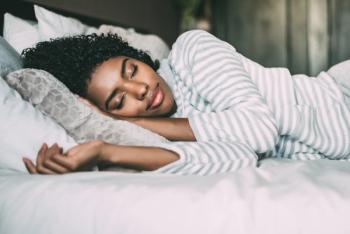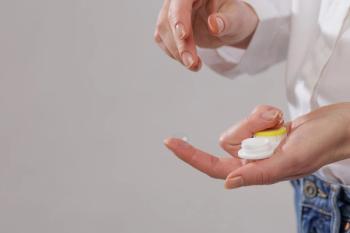
Expert advice on safe contact lens wear during COVID-19
With the release of CDC guidelines on contact lens wear and publication of a peer-reviewed paper on the topic, lead author Lyndon Jones, PhD, FCAHS, FCOptom, FAAO, offers advice to ODs and patients alike about safe contact lens wear. Read the paper from Contact Lens and Anterior Eye, “The COVID-19 pandemic: Important considerations for contact lens practitioners.”
Gretchyn Bailey, NCLC, FAAO: Hi, everyone. I'm Gretchyn Bailey. I am editor in chief of Optometry Times, and I am sitting here with Dr. Lyndon Jones. He is director of the Centre for Ocular Research and Education, or CORE, at the University of Waterloo School of Optometry in Waterloo, Ontario, Canada. Hi, Lyndon, and thanks for talking with us today.
Lyndon Jones, PhD, FCAHS, FCOptom, FAAO: Thanks for the invitation, Gretchyn. Good to chat with you.
Bailey: Of course. Well, I know we have got some questions that both doctors and patients are having about contact lens wear with COVID-19. What is safe, what isn't safe? What should doctors be advising patients, and what should patients be doing? So, the first question is about what is going on out there with misinformation. What misinformation are patients and doctors hearing about contact lens wear amid COVID-19?
Jones: Yeah, that is a great place to start. We know that there is an awful lot of rumors, speculation, and really misinformation being spread these days about many aspects relating to COVID-19. This novel coronavirus has produced a wealth of information, not all of which is necessarily good. And sadly, the misinformation about contact lenses is that patients who wear contact lenses are more likely to develop COVID-19 than if they wear spectacles. We just recently published a paper. We conducted a very extensive scientific review of the literature. And basically, in our review, plus the CDC has come up with very much a conclusion that that is not the case. There really is no scientific evidence to support the fact that contact lens wearers are more likely to develop COVID-19 than spectacle wears or people who need no vision correction at all.
Bailey: That is really great news. That is great. So, my next question for you is, what does the CDC suggest for contact lens wear?
Jones: Well, as I have just said, really, the CDC just this week published information about contact lens where and its conclusion is very much the same as our peer reviewed publication that also came out this week. And that is: patients are perfectly safe to continue wearing contact lenses and they need have no concerns that they are more at risk of developing a COVID-19 infection, even if they wear their spectacles. The other things that come up very clearly, is that, hygiene is extremely important. I think what has happened that has changed during this time of COVID-19 is that people are more aware of it. I think the whole issue about ensuring that we wash our hands thoroughly with soap and water, and then dry them before we handle our contact lenses, and in fact, not just contact lenses, but also our spectacles as well, is now critical. It really is important that hygiene is at a maximum at this time of concern about COVID-19.
Bailey: Well, that is not a bad thing, because we have always had conversations with patients about making sure that hygiene is up to snuff that you are not using a moisture-based soap. You are not putting your contact lenses in your mouth to wet them. So that is not a bad thing that hygiene is becoming the forefront of the conversation.
Jones: I think that is very important question. I think, what really is important things have not changed. It is just that now people are thinking more about them And I think this is a great educational opportunity for clinicians to have that conversation with their patients and I think patients are going to be more receptive to it.
Bailey: I agree. Absolutely agree. So, I understand that you have 5 facts that ODs and contact lens fitters should be sharing with their patients, would you talk about those?
Jones: I will indeed, and we are going to be providing on a website that is going to be active this week. If people are more interested in reading more information about this, then if they go to covideyefacts.org, that's COVIDeyefacts.org. They will be able to find this information in a variety of formats, including some that they can download, and either send to their patients or use with their patients in the practice. Those 5 facts are, basically, reassure your patients that they can keep wearing contact lenses. It is important that they exercise the hygiene that they have used, or should have been using really forever, but we can reassure them that contact lens wear is safe. Good hygiene habits really are critical. Make sure that you wash your hands but not only just with contact lenses, so obviously before you ever apply your lenses or remove your lenses, make sure you thoroughly wash your hands and dry them. But that is also the same with spectacles. We have got really good evidence now that the virus that causes COVID-19 can actually exist for quite a long time on hard plastics, including spectacles, so make sure that you also regularly clean and dry your spectacle lenses, as well. Thirdly, regular eyeglasses do not provide protection against this virus. There is a lot of, again, misinformation about them, that wearing spectacles or even wearing sunglasses over the top of your contact lenses can actually protect you from this virus. That is not the case. It is not the same as the protection that you get from personal protective equipment.
Bailey: Sure.
Jones: So, don't get conned into thinking that spectacle lenses will provide protection. Fourth, absolutely whether you are a contact lens wearer, spectacle wearer, or require no vision correction at all. Keep unwashed hands away from your face, make sure that we wash our hands regularly. And if ever, you are going to touch your face, or your eyes, your nose, anything around the face at all, make sure it is with clean, washed, dried hands. And finally, if you are sick for whatever reason, and again, this advice is not new, it is not different. That is the time when you should not be wearing your contact lenses. That is the time to revert to spectacles. And before you go back into wearing contact lenses, again, make sure that you are fully healthy. Then, the last really important reason is that if ever, patients are concerned about inflammation, the person to check in with is their eye care professional. That is the person who knows that patient best. They know what is best for the patient, and they should be the ones that should be asked for advice, not Dr. Google.
Bailey: Well, that is always good advice to go to your doctor as opposed to googling for advice. Absolutely. So, here is a bit of a twist of a question. I know that daily disposables have been out in the market. A lot of doctors say that they are the best option and they might be for many, many patients. Given that we have this viral concern. Would you say that daily disposables are the best option out there for patients who want to wear contact lenses? Well, I think we froze up for a second.
Jones: So, we looked into those. Can you hear me okay?
Bailey: There we go. We are back.
Jones: That is a great question, Gretchyn. That was actually one of the things that we looked at in our scientific review that was published this week. And basically, there is no scientific evidence to show that patients are or should not be wearing daily disposables to week or monthly replacement lenses. There is no scientific evidence out there at the moment to show that any one lens type is better than the other. And again, what I would suggest is that patients who are concerned should always be checking in with their practitioner as to what the best lens type is to wear for that individual patient. It is the practitioner who knows that patient's eye, their lifestyle, other factors that may well be relevant to the option of lenses that they were. Basically, if they use reusable lenses and follow the manufacturer's instructions, then all lens types should be perfectly safe to wear in this time of the pandemic.
Bailey: That is really great to hear. And a slight follow up on that then what about gas permeable or as patients call them hard lenses? Are they a problem for patients to wear?
Jones: Again, really very much the same answer. At the moment, you know that, this is a novel coronavirus. And by novel, it means that we have very little information on it. To the best of my knowledge. No one has really looked at whether this virus binds to any different types of lenses. Whether there is a variation in the care systems that are available in terms of their ability to deal with the virus, but at this moment in time, we have no scientific evidence to question any of the lens types. Practitioners, sorry patients, so long as they follow the manufacturer's instructions and the recommendations of the practitioner, patients should be totally fine to wear any of the lens types.
Bailey: That is really great news. Great to hear both for doctors and patients. And do you have any last advice to offer to contact lens fitters who are wondering about some of these questions themselves and how to communicate with patients?
Jones: Yeah, I think that, as I said, right at the very beginning, there has been so much misinformation and really poor information given about the fact that people should not be wearing contact lenses. That is simply not the case. There is no scientific evidence to suggest that patients should not be wearing contact lenses at the time of the pandemic, it is very important that everyone exercise maximal hygiene procedures. But again, that has really been no different since we started wearing contact lenses. I think just people are more heightened about it. And the misinformation is unfortunate. But basically, you can recommend your patients, they can continue to wear them.
Bailey: And that is good news, Lyndon. Thanks very much for talking with us today.
Jones: Welcome. Thanks very much. We will take a look. Again, if anyone would like more information, please go to
Bailey:
Newsletter
Want more insights like this? Subscribe to Optometry Times and get clinical pearls and practice tips delivered straight to your inbox.





























